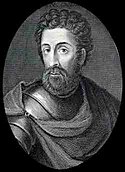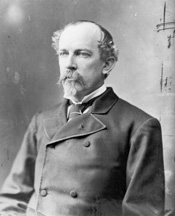Perry family
Mercy Hazard was a seventh-generation descendant of Captain Richard Raymond (1602–1692), and his wife, Julia,[3] who was likely born in Essex County, England, in 1602 and arrived in Salem, Massachusetts, about 1629, possibly with a contingent led by the Rev.
Christopher Perry enlisted, at the age of 14, in a local militia company named the Kingston Reds early in the American Revolution.
The Mifflin was captured by the British and Perry was confined to the infamous prison ship Jersey in New York harbor for three months before he managed to escape.
[6] In 1779, Perry joined the Continental Navy as a seaman aboard the frigate USS Trumbull commanded by Captain James Nicholson.
Perry managed another escape by masquerading as a British seaman and taking passage to St. Thomas in the Virgin Islands.
The young couple then moved to South Kingstown, Rhode Island, where they lived with Perry's parents on their 200-acre estate.
[13][circular reference] Oliver Hazard Perry (1785–1819) was an American naval commander, born in South Kingstown, Rhode Island.
[16] He is remembered for the words on his battle flag, "Don't Give Up the Ship", which was a tribute to the dying command of his colleague Captain James Lawrence of USS Chesapeake.
He is also known for his message to General William Henry Harrison which reads in part, "We have met the enemy and they are ours; ..." Perry became embroiled in a long-standing and bitter controversy with the commander of USS Niagara, Captain Jesse Elliott, over their conduct in the Battle of Lake Erie, and both were the subject of official charges.
Matthew Calbraith Butler, who was born on March 8, 1836, at Eagle's Crag near Greenville, South Carolina, was the son of U.S.
[23][24] Together, they were the parents of six children, with all of his surviving sons becoming involved in politics:[25] Perry Belmont (1851–1947),[26] served as a Democrat to the 47th Congress, followed by a career in the U.S. representative for the first district of New York from March 4, 1881, until his resignation on December 1, 1888.
Belmont also served from 1885 to 1887 as chairman of the committee on foreign affairs, and on October 6, 1890, was invested as a Commander of the French Legion of Honor.
[34] Oliver Hazard Perry Belmont (1858–1908),[35] was a member of the banking firm of August Belmont and Co., New York City, and a publisher of the Verdict, a weekly paper,[36] who additionally served as delegate to the Democratic National Convention in 1900, and was elected as a Democrat from New York's 13th District to the Fifty-seventh Congress serving from March 4, 1901, until March 3, 1903.
John Rodgers (1881–1926) was an officer in the United States Navy and a pioneering aviator who led the first attempt at a non-stop flight from California to Hawaii.
Due to the risks, the Navy positioned 10 guard ships spaced 200 miles apart between California and Hawaii to refuel or recover the aircraft if necessary.
Calbraith Perry Rodgers (1879–1912) was an American aviation pioneer, the cousin of the aforementioned, who made the first transcontinental airplane flight across the U.S. from September 17, 1911, to November 5, 1911, with dozens of stops, both intentional and accidental.
[42] A special train of three cars, including sleeper, diner, and shop-on-wheels full of spare parts, was assembled to follow Rodgers, who planned to fly above the railroad tracks.
Oliver's older brother, Christopher La Farge (1897–1956) was a watercolor artist, poet, short story writer, and novelist whose compositions often chronicled Rhode Island life.
His son, Peter La Farge (1931–1965), was an American folk music singer in Greenwich Village, who worked along with Bob Dylan, Ramblin' Jack Elliott, Dave Van Ronk, and Pete Seeger, and is famous for writing the song "The Ballad of Ira Hayes".
[44] Perry's grandniece, Ruth Ann Black (1893–1964), married naval architect and Gulf Oil executive Willard F.








